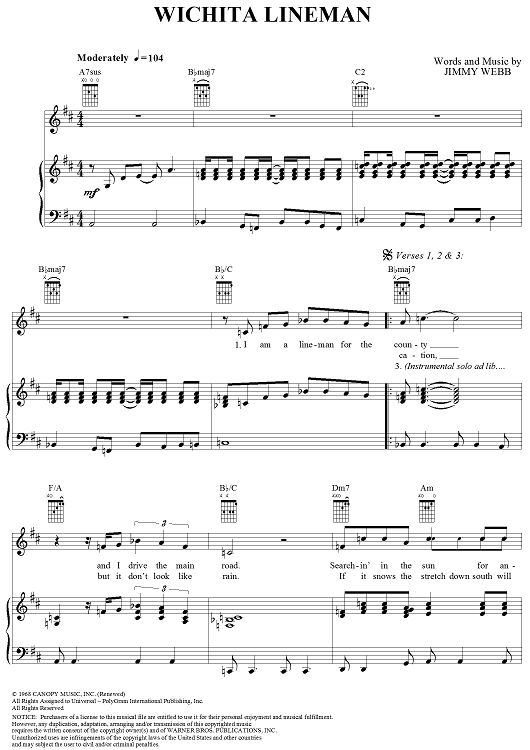Today I’ve been listening to ‘Wichita Lineman’ by Glen Campbell.
It’s a song I’ve been aware of in the background for years. I’ve always liked that sudden upward jump in the vocal at the end of the chorus, on the word ‘line’. But I’ve never sat down and listened to it properly before. I’ve never listened to the words before today and had idly assumed the song was something to do with railways.
Something made me listen to it properly today, at last, and read about it. I don’t know what.
Now I’m proper full-on in love with it.
I like some of the things I’ve read about it today. “Somewhere between pop and country music, without really being either.” That’s good. “One of those rare songs that seems somehow to exist in a world of its own – not just timeless but ultimately outside of modern music.” That’s really special.
I’ve found the chords on the web and played it through a few times. I like the effect when it goes to a straight G and D (“another overload”) after drifting around on minor sevenths. It’s really unexpected and powerful, without sounding too weird.
(I don’t like trying to play B flat major seventh.)
I really like the arrangement. The strings. The line. The sky. The distance.
I love the lines “And I need you more than want you/And I want you for all time”. That’s some big yearn going on. This illustrates how different words can be when they’re sung from when they’re written. It looks a little plain just typed up on the screen like that, without the music. But with the music, the way it’s sung, it’s devastating.
Best of all I like the story of how it was written. The songwriter is Jimmy Webb. These quotations are from the song’s Wikipedia page:
Jimmy Webb’s inspiration for the lyrics came while driving through Washita County in rural southwestern Oklahoma. At that time, many telephone companies were county-owned utilities and their linemen were county employees. Heading westward on a straight road into the setting sun, Webb drove past a seemingly endless line of telephone poles, each looking exactly the same as the last. Then, in the distance, he noticed the silhouette of a solitary lineman atop a pole. He described it as “the picture of loneliness.” Webb then “put himself atop that pole and put that phone in his hand” as he considered what the lineman was saying into the receiver.
The actual song lyrics mention the name “Wichita” rather than Washita. Campbell said it was because “Wichita sings better.”
The lyrics describe the loneliness that a telephone or electric power lineman feels while he works and his longing for an absent lover.
The phrase “singing in the wire” can refer to the sonic vibration commonly induced by wind blowing across small wires and conductors, making these lines whistle or whine like an aeolian harp. It could also, or even simultaneously, refer to the sounds that a lineman might hear when attaching a telephone earpiece to a long stretch of raw telephone or telegraph line, i.e. without typical line equalisation and filtering. In the recording, a notable feature of the orchestral arrangement is the effort of the violins and keyboards to mimic these ethereal sounds and morse code, and the lyric, “I can hear you through the whine” further alludes to them.
Isn’t that wonderful? I just thought I’d quickly share that. I don’t think I’m going to cover it or anything. But I would love to write a song that seems to exist in a world of its own.

This has been one of my favourite songs for many years and you have captured its essence wonderfully. Have a listen to another Webb/Campbell collaboration – By the Time I Get to Phoenix – not as good, but poignant and simple and just the right length for a song at 2.46.
One of the best songs ever written.
It’s a classic…